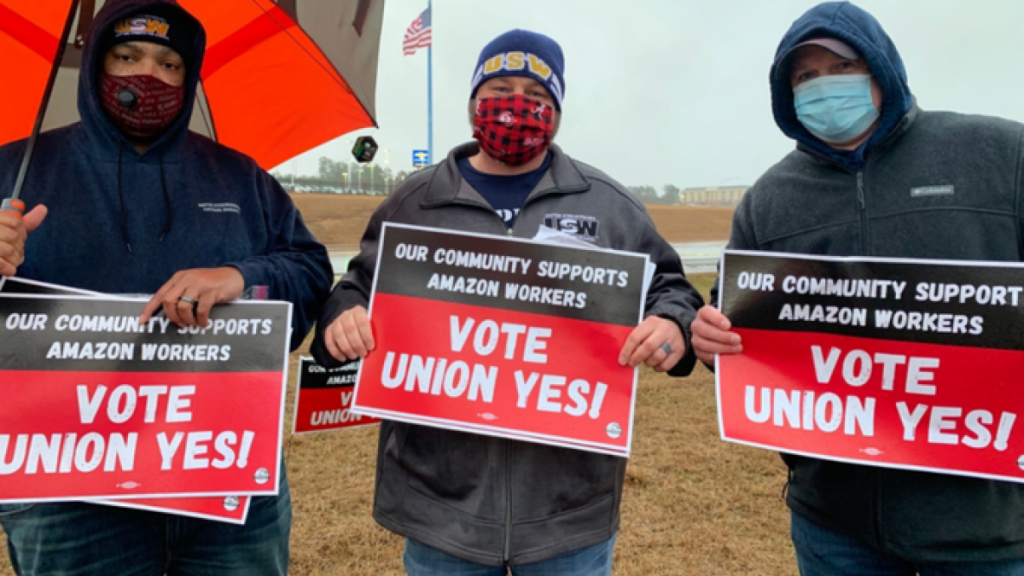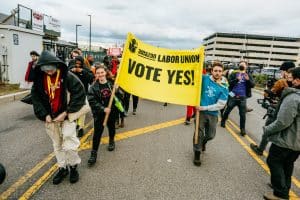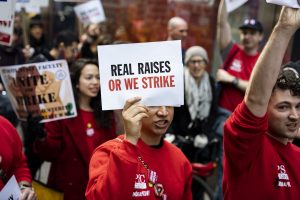It’s been three days in Alabama and I’m in an Uber again. This time I’m headed to Bessemer, which is about 30 minutes from Birmingham, to the front of the Amazon warehouse. There is a “Standout at Warehouse Gates” on Tuesday evening that I’m eager to attend.
I hop in the Uber and am greeted by a man wearing an American flag mask. My anti-imperialist spidey senses start to tingle, but then he says “good afternoon” and I hear his accent. Middle Eastern maybe? But definitely an accent. I wonder what it’s like to have that accent in Alabama. I wonder if that’s why he’s wearing that mask.
We strike up a conversation and as it turns out, he’s not only an Uber driver. He also drives for Amazon and Whole Foods. He is a Middle Eastern immigrant who has been in Alabama for 40 years. He’s 65 years old and should be retired, but he has to drive just to make ends meet. “Of course the Amazon workers need a union,” he says emphatically. “Uber really needs a union too! It’s too easy for them to exploit us and we have no security at all,” he says. Uber workers are independent contractors, with no workplace protections, healthcare, or other “benefits.”
He tells me that working at Amazon is terrible. Amazon has recently shifted from using UPS to ship its goods to a structure of independent contractors. They also use Amazon Delivery Service Partners (DSP), which are small “independent” delivery service companies made up of fleets of 20-40 vans. They even use Amazon Flex drivers, who supply their own cars and get paid at the end of the delivery route. These workers are even more precarious than fulfillment center workers, making it difficult not only to unionize this sector, but also to enforce minimum wage protections and basic labor law.
In both cases, workers are given super high quotas and routes determined by an algorithm that has drivers working at an inhuman pace. As labor journalist Lauren Kaori Gurley explains, drivers are forced to run back and forth across the street so they don’t lose time — some drivers have even been hit by cars and killed as they struggle to meet Amazon’s quotas. These are “[s]ome of the least protected and most brutal jobs,” she argues.
My Uber driver tells me, “[I]t really hurts my body. I’m not so young anymore and I can’t be walking around everywhere with heavy packages. It just really tires your body. So that’s why I don’t work there as much anymore.”
He explains to me that Amazon is taking over Alabama. In fact, another warehouse is opening in a nearby city. “Maybe if this warehouse unionizes, it can help the others unionize too and get better working conditions. Maybe it can even help drivers like me.”
As we arrive at Amazon, it’s hard to see the whole warehouse. But from what I can tell, it’s huge. And the parking lot? I’ve seen smaller parking lots for concert venues. I think of the workers who have to walk the entire warehouse to go to the bathroom. I think of workers having to walk the expanse of the warehouse several times throughout the day as they fill boxes. The workers are overwhelmingly Black, and suffer not only systemic racism but also hyper-exploitation, as Black folks have throughout all of history. I think of how Amazon measures the workers’ “Time off task”— a period in which they are not mechanically scanning packages. Every move is tracked, and workers who fall below a “productivity threshold” are disciplined or fired. I want the workers inside to know how angry I am at their inhumane working conditions and the way they are forced to sacrifice their bodies and their time to produce wealth for Bezos and Amazon. Standing outside with a sign is hardly enough to express this.
The streets are lined with banners supporting the union. “Without change, nothing changes. Union yes!” and “Stronger Together. Vote Yes!” One banner sports Stacey Abrams dressed like Rosy the Riveter in support of the union.
Abrams’ support certainly brought attention to the unionization struggle. But the sign gives the wrong message — a message that unions all over the country impart to workers. Over and over they tell workers that their power comes from Democratic Party politicians, that their power is at the polls and that workers are helpless without the support of politicians. Nothing could be further from the truth. Amazon workers are the source of profit for one of the biggest corporations in the country and Amazon workers make the national economy run by delivering essential packages that include medicine, PPE, and other essential supplies. Their power is in their ability to withhold their labor, not in Stacey Abrams or any other capitalist politician.
The rank and file will have to fight for the union to be an independent fighting force, rather than a wing of the Democratic Party. If we judge by the excessive focus on Abrams, as well as the visits of other Democratic Party politicians, this bodes poorly for a future union at Bessemer.
There are only about a dozen folks gathered outside Amazon’s gates. It’s raining, but people are not deterred. There are a handful of Socialist Alternative members, with painted signs that say “Unionize Amazon, Unionize the South” and union banners that read “Our Community Supports Amazon Workers. Vote Union yes!” There are about five union staffers and the Vice President of the Union here, as well as a few folks from an environmental justice non-profit SWEET Alabama and a few people who aren’t affiliated with any groups.
I grab my sign and try to cross the street. It’s a busy four lane road and I have to run in order to make it. When I try to cross again, I turn to say something to a comrade and when I’ve turned back, the light is green and I can’t cross. It’s one of the fastest lights I’ve seen.
And it’s no wonder. Amazon petitioned Bessmer to change the length of the lights outside their facility so that workers would have less contact with the folks like us standing in solidarity outside. The city granted the petition. It’s one of the most absurd examples of the great lengths Amazon is going through to bust the union.
I stand on the corner and wave my poster as people drive by. We get some honks in solidarity — some individual cars, a few big trucks, and a bus. I strike up a conversation with a healthcare worker from elsewhere in Alabama who drove to Bessemer to stand in solidarity. She’s not with any groups; she’s just a worker who felt that it was only right to stand in solidarity with the Amazon workers. Soon, another volunteer comes over to tell us we have to move. There are four people on our corner, and apparently there is an ordinance that says that only three people can gather on a corner. Amazon, in coordination with the local police, is being strict about enforcing the ordinance. Yet another example of Amazon’s union busting tactics.
We trudge to another corner in the rain and wind in the grass because there is no sidewalk, and I wonder if this is another ordinance that Amazon got the government to pass. Lights, number of people on the corner… after all, as Marx explains, the state is “nothing but a committee for managing the common affairs of the whole bourgeoisie.” They can even get them to change the time for traffic lights.
As workers drive out of the warehouse, a few give a friendly wave and smile. But mostly, they don’t say much to us and there aren’t any workers standing outside with us. I wonder if this is because of the fear of repression — Amazon has been pulling out all the stops to fight the union. They are spending $10,000 a day on a private union-busting firm. They pull workers into anti-union meetings on the job and put up anti-union posters in the bathroom. They threatened workers with job losses and are making calls and texting each individual worker with anti-union rhetoric.
I don’t know the internal workings of this union drive — and I’m here to find out. But I know that the norm is top-down, business unionism. It’s what the majority of unions have become: supporters of the Democratic Party that have refused to fight layoffs and austerity. This isn’t a reason to give up on unions completely, but we need to fight to take them back. We have to understand that this unionization struggle at Amazon is an important first battle, not the whole war. Just having a union isn’t enough; it has to be run by the workers, for the workers. It means the rank and file of the union should demand that decisions be made by the rank-and-file, not by the union leaders at the top. It means that workers should demand a union that fights also for the community that has supported it throughout this struggle.
What is beautiful about this struggle is that there is a lot of community support, as I wrote in another recent article. Today at the demonstration I met a young person from Birmingham who agrees to an interview. “This is one of the biggest things to happen in Birmingham and it has the potential.” He goes on to say, “When I first heard about all the efforts Amazon is going to suppress this and all the union intimidation tactics, it’s insane. I just feel like the employees really need to know they are supported.”
Yesterday in the rain and wind, a dozen people gathered to stand in solidarity with the Amazon unionization drive outside the warehouse in Bessemer.
We spoke to Birmingham resident, Paul, who was out there in solidarity with the workers in BHM1. #BAmazonUnion @BAmazonUnion pic.twitter.com/M7KVeOrbyE
— Left Voice (@left_voice) March 24, 2021
We’re only a few days from when the votes will be counted — March 29th. We’ll know soon if the union drive is successful. Everyone is optimistic, from union staffers to the folks who live in Birmingham.
After about two hours of standing outside, the rain picks up and it gets super windy. My sign has essentially become mush in my hands. I get a ride with comrades back to our Airbnb and I look out the window to Bessemer. There are boarded up homes and a few that look like they burned down. There are dilapidated homes and rusty old cars in lawns. The minimum wage here is only $7.25 an hour and it’s both the Democrats and Republicans’ fault. It’s clear that that neoliberalism, institutional racism, and the legacies of slavery, Jim Crow, and segregation are alive and well in this predominantly Black community. But it’s also clear that the history of Black resistance is alive and well too, from Alabama’s radical union legacy and the Civil Rights Movement to now, potentially, the first Amazon union in the country.
While of course winning a union isn’t going to undo the deteriorating conditions for the working class, especially the Black working class, that neoliberalism has condemned to poverty and precarity, it would be an important step on the path of the working class fighting for better conditions and a little piece of what’s ours. It’s not enough — we have a world to fight for. But it’s a start.
Without a doubt, this union drive is creating a local and national conversation about the deep inequalities of capitalism and the need to stand in solidarity against the giants who oppress us. It’s moving young folks to stand in the rain in solidarity and Amazon workers all over the country to seek out unions to think about unionizing their workplaces.
When I left, the young person I had spoken to was still out there in the rain — no umbrella, but tons of energy. “In the South, there is not a lot of working class solidarity and I feel we need more of that.” This feels like just the beginning.











